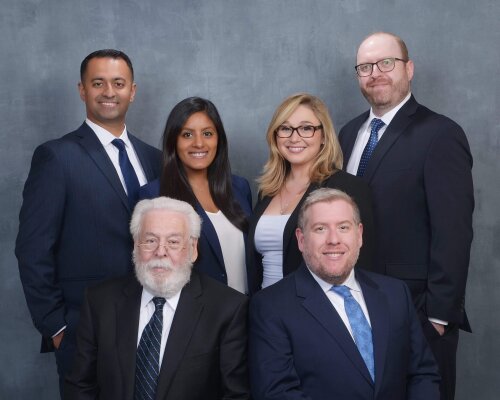Best Wrongful Death Lawyers in Philadelphia
Share your needs with us, get contacted by law firms.
Free. Takes 2 min.
List of the best lawyers in Philadelphia, United States
About Wrongful Death Law in Philadelphia, United States
Wrongful death claims arise when a person dies because of another party's negligence, recklessness, or intentional act. In Philadelphia, wrongful death cases are governed primarily by Pennsylvania state law, and most claims are filed in the Philadelphia County Court of Common Pleas. A wrongful death action is a civil lawsuit brought on behalf of the deceased person's estate and surviving family members to recover damages for losses caused by the death. Wrongful death law is separate from any criminal prosecution that may follow the same conduct. While a criminal case seeks to punish the offender, a wrongful death lawsuit seeks financial compensation for the survivors and the estate.
Why You May Need a Lawyer
Wrongful death cases are emotionally difficult and often legally complex. You may need a lawyer if the death involved a motor vehicle collision, medical error, workplace accident, defective product, nursing home abuse, motor vehicle defect, construction accident, or another instance of negligent or intentional conduct. A lawyer can help by determining who is legally responsible, preserving crucial evidence, obtaining police and medical records, calculating the full scope of damages, handling communications with insurers, meeting procedural deadlines, and representing you in court if necessary. Lawyers experienced in wrongful death matters also understand how to pursue both wrongful death and survival claims together to protect the full range of recoverable losses.
Local Laws Overview
Several local and state rules affect wrongful death actions in Philadelphia. Key points to know include the following.
- Governing statutes. Pennsylvania's Wrongful Death Act and related survival statutes provide the legal basis for bringing suit and describe who may bring a claim and what damages are recoverable. Claims are typically brought by the personal representative of the decedent's estate on behalf of eligible survivors.
- Who may file. A wrongful death action is generally brought by the executor or administrator of the decedent's estate. Recoverable damages are paid to the decedent's spouse, children, parents, or other dependents according to the estate administration process.
- Statute of limitations. Pennsylvania imposes time limits for filing wrongful death and survival actions. These deadlines are strict. Missing the applicable time limit can bar recovery. Because different rules may apply when a government entity or a particular type of defendant is involved, it is important to consult an attorney promptly.
- Types of recoverable damages. Survivors commonly recover economic losses such as loss of financial support, loss of benefits, funeral and burial expenses, medical expenses related to the injury that caused death, and loss of household services. The estate can pursue non-economic losses that the decedent suffered before death, such as pain and suffering, through a survival action. Punitive damages may be available in limited circumstances where the defendant's conduct was willful, malicious, or wanton.
- Comparative fault. Pennsylvania applies a comparative negligence system. If the decedent was partially at fault for the incident that caused their death, the recoverable damages may be reduced in proportion to that fault. The specifics of how comparative fault affects recovery can be complex, so legal advice is recommended.
- Government defendants. If a city, county, state agency, or public employee may be liable, different rules and notice requirements often apply. Claims against government entities can require short notice periods and special procedures before a lawsuit can be filed.
- Local court practice. In Philadelphia, wrongful death and related survival claims are handled in the Court of Common Pleas. Cases may go through mandatory mediation, settlement negotiations with insurers, and trial if necessary. Local procedural rules and courtroom practice can affect timelines and strategy.
Frequently Asked Questions
What is the difference between a wrongful death action and a criminal case?
A criminal case is prosecuted by the state to punish a defendant for violating criminal law. A wrongful death action is a civil lawsuit brought by the decedent's estate or survivors to recover monetary damages for losses caused by the death. Both can proceed independently. A criminal conviction can be used as evidence in a civil case, but it is not required to win a wrongful death claim.
Who can file a wrongful death lawsuit in Philadelphia?
Under Pennsylvania law, the personal representative of the decedent's estate normally files the wrongful death action. The damages recovered are distributed to the decedent's statutorily defined heirs or beneficiaries, such as a spouse, children, or parents. If there is no personal representative, the court may appoint one to pursue the claim.
How long do I have to file a wrongful death claim?
There are strict time limits for filing wrongful death and survival actions in Pennsylvania. These statutory deadlines vary by the type of claim and the involved parties, and special shorter deadlines may apply for claims involving government entities. Because deadlines can be brief and missing them may bar recovery, contact an attorney as soon as possible.
What kinds of damages can survivors recover?
Survivors can recover economic losses such as loss of financial support, loss of anticipated inheritance, funeral and burial expenses, and medical expenses related to the fatal injury. The decedent's estate can bring a survival action to recover damages the decedent suffered before death, including pain and suffering. Punitive damages may be available in rare cases involving particularly egregious conduct.
Can I sue if the person who caused the death was drunk or committing a crime?
Yes. Civil liability is separate from criminal liability. Intoxication, reckless driving, or commission of a crime can support a wrongful death claim and may strengthen the case for punitive damages. Even if the responsible person is criminally prosecuted, you can still file a civil wrongful death lawsuit.
What if a government employee or agency caused the death?
Claims against government entities and employees typically have special notice requirements and procedural rules. These requirements can shorten the time to bring a claim or require pre-suit notice. Because the rules are different from ordinary negligence claims, consult a lawyer quickly if a public employer or government actor may be involved.
How does comparative negligence affect my case?
If the deceased person was partially at fault for the incident, Pennsylvania's comparative negligence rules can reduce the amount recoverable in a wrongful death case in proportion to the decedent's share of fault. The law and how it applies can be complicated, so an attorney will evaluate fault allocation and present evidence to minimize any assigned fault to the decedent.
What evidence is important in a wrongful death case?
Key evidence often includes police and accident reports, medical records, autopsy and medical examiner reports, witness statements, photos and video, employer records, maintenance and inspection logs, and any available expert opinions. Preserving evidence early is critical because physical evidence and witness memories can deteriorate over time.
How long will a wrongful death case take to resolve?
Timelines vary greatly. Some cases settle within months if liability is clear and the parties negotiate early. More complex cases involving disputed liability, catastrophic facts, or government defendants can take years through discovery, motions, and trial. A lawyer can provide a realistic timeline after reviewing the case details.
How do wrongful death lawyers typically get paid?
Many wrongful death attorneys work on a contingency-fee basis, which means the lawyer is paid a percentage of the recovery if the case succeeds. If there is no recovery, most contingency arrangements mean the client does not pay attorney fees, though there may still be costs associated with the case that the firm handles or advances. Ask any prospective lawyer for a clear written fee agreement and an explanation of fees and costs during your initial consultation.
Additional Resources
When seeking help or information about wrongful death matters in Philadelphia, the following resources and organizations can be useful. Contact an attorney for specific legal advice tailored to your situation.
- Philadelphia County Court of Common Pleas - Civil Division for filings and local court procedures.
- Philadelphia Medical Examiner or Office of the Chief Medical Examiner for autopsy and death investigation records.
- Philadelphia District Attorney's Office for information about related criminal prosecutions.
- Philadelphia Bar Association Lawyer Referral and Information Service for help finding experienced local wrongful death attorneys.
- Pennsylvania Bar Association for statewide legal resources and attorney directories.
- Pennsylvania Department of Transportation, if the death involved a motor vehicle crash and roadway issues.
- Local legal aid organizations and specialized centers for victims and families, including elder law and consumer advocacy groups for nursing home or product defect cases.
- National professional organizations that provide educational resources and policy information on wrongful death and wrongful injury law.
Next Steps
If you believe you have a wrongful death claim in Philadelphia, consider these practical next steps.
- Seek immediate legal advice. Contact an experienced Philadelphia wrongful death attorney for a prompt consultation to protect your rights and to identify any urgent deadlines.
- Preserve evidence. Keep and preserve medical records, death certificate, police or accident reports, photos, videos, phone records, and any receipts related to funeral and medical expenses. Ask a lawyer to send preservation letters if needed.
- Obtain official records. Request copies of the police report, medical records, and the medical examiner's report. Your lawyer can help obtain these records through formal requests.
- Do not sign releases or give recorded statements to insurers without a lawyer present. Insurance companies may try to minimize or deny claims early on.
- Prepare documentation. Gather information about the decedent's income, benefits, financial contributions to the household, health care costs prior to death, and a list of survivors and their relationships to the decedent. This helps your attorney calculate damages accurately.
- Ask about fees, costs, and strategy. In your first meeting, ask the attorney how they charge, who will handle the case, likely timelines, and whether they anticipate settlement or trial. Request a written fee agreement.
- Consider emotional and practical support. Wrongful death cases are stressful. Look into grief counseling, victim services, and community resources to help your family through the immediate aftermath.
Moving forward promptly gives you the best chance to preserve evidence, comply with deadlines, and pursue fair compensation. A qualified attorney can explain your options and guide you through each stage of the process.
Lawzana helps you find the best lawyers and law firms in Philadelphia through a curated and pre-screened list of qualified legal professionals. Our platform offers rankings and detailed profiles of attorneys and law firms, allowing you to compare based on practice areas, including Wrongful Death, experience, and client feedback.
Each profile includes a description of the firm's areas of practice, client reviews, team members and partners, year of establishment, spoken languages, office locations, contact information, social media presence, and any published articles or resources. Most firms on our platform speak English and are experienced in both local and international legal matters.
Get a quote from top-rated law firms in Philadelphia, United States — quickly, securely, and without unnecessary hassle.
Disclaimer:
The information provided on this page is for general informational purposes only and does not constitute legal advice. While we strive to ensure the accuracy and relevance of the content, legal information may change over time, and interpretations of the law can vary. You should always consult with a qualified legal professional for advice specific to your situation.
We disclaim all liability for actions taken or not taken based on the content of this page. If you believe any information is incorrect or outdated, please contact us, and we will review and update it where appropriate.












